Tolkien Calendar: The Great Years
Tolkien Calendar: The Great Years
February 16, TA 3019
16 February 2006 14:05:49Farewell to Lórien. Gollum in hiding on the west bank observes the departure.
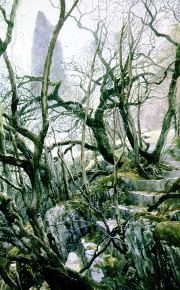
Tolkien devotes an entire chapter to the farewell to Lorien, and in this chapter I have always felt that it is here where he, in effect, transfers the keys of Middle-earth from the Elves to the other races. Advice is given. Food is shared. But it is Galadriel's giving of gifts to the Fellowship that seems to best signify this passage.
It is Galadriel's gift to Sam of the blessed earth from her garden. She does not give him weapons for battle, but life-giving earth so that the abundance of growing things is bequeathed to Sam.
To Frodo she gives the gift of light so that darkness will not dominate Middle-earth, even in its darkest hours. "May it be a light to you in dark places when all other lights go out."
To Gimli she gives the gift of hope in the guise of three strands of her golden hair, and she reminds him that the real treasure of Middle-earth is not valued in material wealth. As she places the strands in Gimli's hand, she prophecies, "...on the one hand lies darkness, and on the other only hope. But if hope should not fail, then I say to you, Gimli son of Glóin, that your hands shall flow with gold, and yet over you gold shall have no dominion."
And it is to Aragorn, as is only fitting, that Galadriel bestows the gifts of most significance for the future of Middle-earth. She gives him a sheath for Andúril with the charge, "The blade that is drawn from this sheath shall not be stained or broken even in defeat." And then she almost speaks a personal farewell to him and Middle-earth, "For darkness will flow between us, and it may be that we shall not meet again, unless it be far hence upon a road that has no returning." But Tolkien and Galadriel do not leave Aragorn (or us) without hope for the future. "This stone I gave to Celebrían my daughter, and she to hers, and now it comes to you as a token of hope. In this hour take the name that was foretold for you, Elessar, the Elfstone of the house of Elendil!"
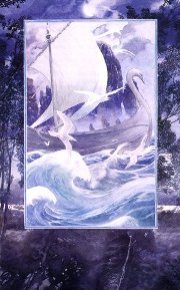
And thus, having bestowed the gifts most treasured by Elves and Men and Dwarves and Hobbits, it is as if Galadriel sings the Elven farewell to all of Middle-earth...
Quote:
Of wind I sang, a wind there came and in the branches blew.
Beyond the Sun, beyond the Moon, the foam was on the Sea,
And by the strand of Ilmarin there grew a golden Tree.
Beneath the stars of Ever-eve in Eldamar it shone,
In Eldamar beside the walls of Elven Tirion.
There long the golden leaves have grown upon the branching years,
While here beyond the Sundering seas now fall the Elven-tears.
O Lórien! The Winter comes, the bare and leafless Day;
The leaves are falling in the stream, the River flows away.
O Lórien! Too long I have dwelt upon this Hither Shore
And in the fading crown have twined the golden elanor.
But if of ships I now should sing, what ship would come to me,
What ship would bear me ever back across so wide a Sea?
Idyllic Lórien is left behind by the Fellowship. The winds blow cold again and danger comes swiftly in the shape of Gollum.
Images © "Tol Brandir" & "The Grey Ship of the Elves" by Alan Lee.
February 17, TA 3019
17 February 2006 12:52:41Gwaihir finds Gandalf and carries him to Lothlorien
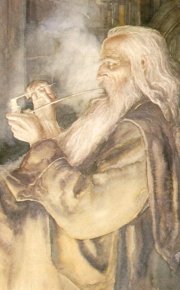 Throughout the Lord of the Rings, Tolkien sets the characters to many tests. Some of them fail. Some of them, like Boromir, stumble but rise again in the end to do the right thing. Some, like the Radagast, appear to become distracted. Only a few pass each test, gaining power and wisdom as they do. In his Letters (156 To Robert Murray S. J.), Tolkien says that Gandalf is the only one of the wizards who passed all the tests. The last test, the battle with the Balrog, cost him his life.
Throughout the Lord of the Rings, Tolkien sets the characters to many tests. Some of them fail. Some of them, like Boromir, stumble but rise again in the end to do the right thing. Some, like the Radagast, appear to become distracted. Only a few pass each test, gaining power and wisdom as they do. In his Letters (156 To Robert Murray S. J.), Tolkien says that Gandalf is the only one of the wizards who passed all the tests. The last test, the battle with the Balrog, cost him his life. In the Unfinished Tales, Tolkien says the wizards were sent by the Valar as emissaries and that:
Quote:
"they must be peers of Sauron, but they must forgo might and clothe themselves in flesh so as to treat equally and win the trust of Elves and Men. But this would imperil them, dimming their wisdom and knowledge, and confusing them with fears, cares, and weariness coming from the flesh."
This and other things I have read has always led me to believe that in many way, the Isatri, the wizards, had to forget much of who they are so that they could "treat equally with Elves and Men". In additon, it seems from the descriptions that this last battle forced Gandalf to delve deep within himself to find powers he possessed as a Maia, powers that had lain long forgotten, in order to defeat this ancient evil. After the battle with the Balrog, the Gandalf who returned to Middle Earth was not the same Gandalf who fell at Durin's Bridge.
It has seemed to me that in many ways that Gandalf was more like himself upon his return. Upon his return to Middle Earth, Gandalf is still bound by the rule that he must guide and not force but he has more power. I think that power comes from knowing himself again. Further more, he has already fulfilled the requirement to win the trust of the peoples of Middle Earth so the use of this power is not going to overwhelm these relationships that have already been built, as we will see later. I think that it is Pippin who notices that Gandalf is different, observing that he is more serious and at the same time more mellow.
On this day Gwaihir, who was sent by Galadriel to search for him, finds Gandalf on the mountaintop and carries him to Lothlorien. There Gandalf recieves healing and is given rest and counsel before he sets out to finish his mission in Middle-Earth. I think in part that his time in Lothlorien furthered his knowledge of who he was and what he was to do.
It has seemed to me that in many ways that Gandalf was more like himself upon his return. Upon his return to Middle Earth, Gandalf is still bound by the rule that he must guide and not force but he has more power. I think that power comes from knowing himself again. Further more, he has already fulfilled the requirement to win the trust of the peoples of Middle Earth so the use of this power is not going to overwhelm these relationships that have already been built, as we will see later. I think that it is Pippin who notices that Gandalf is different, observing that he is more serious and at the same time more mellow.
On this day Gwaihir, who was sent by Galadriel to search for him, finds Gandalf on the mountaintop and carries him to Lothlorien. There Gandalf recieves healing and is given rest and counsel before he sets out to finish his mission in Middle-Earth. I think in part that his time in Lothlorien furthered his knowledge of who he was and what he was to do.
Images © "Gandalf" by Alan Lee.
February 23, TA 3019
18 February 2006 22:46:40The boats are attacked at night near Sarn Gebir.
Well, things have just been too nice for too long for our heroes: a nice, long, leisurely stay in Lothlorien, with a picnic and gifts, and then a nice, long, leisurely float trip down the Anduin. Isn't it time for some adventure?
Aragorn makes an uncharacteristic mistake, loses track of where they are on the river, and nearly takes the Company to their watery graves at the Rapids at Sarn Gebir this night. Oh, and we mustn't forget the subsequent orc attack! And did I mention the Nazgul fly-by?
Aragorn makes an uncharacteristic mistake, loses track of where they are on the river, and nearly takes the Company to their watery graves at the Rapids at Sarn Gebir this night. Oh, and we mustn't forget the subsequent orc attack! And did I mention the Nazgul fly-by?
Quote:
'Elbereth Gilthoniel!' sighed Legolas as he looked up. Even as he did so, a dark shape, like a cloud and yet not a cloud, for it moved far more swiftly, came out of the blackness in the South, and sped towards the Company, blotting out all light as it approached. Soon it appeared as a great winged creature, blacker than the pits in the night. Fierce voices rose up to greet it from across the water. Frodo felt a sudden chill running through him and clutching at his heart; there was a deadly cold, like the memory of an old wound, in his shoulder. He crouched down, as if to hide.
Suddenly the great bow of Lorien sang. . .
Suddenly the great bow of Lorien sang. . .
Oh, yes, my lads, the vacation is over--and things are going to get a lot worse before they get better!
Images © "Nazgul over Minas Morgul" by Alan lee.
February 25, TA 3019
25 February 2006 13:05:44Categories: Tolkien Calendar
The Company pass the Argonath and camp at Parth Galen

On the last day the Fellowship of the Ring has together before its Breaking, the group sails past the Argonath in their Elven boats. These two immense carved figures, one on each side of the River Anduin, represent Isildur and Anarion, the sons of Elendil. Romendacil II had them built in 1340 of the Third Age--almost 2300 years before the events of our tale. They stand in positions of guard, with one hand outstretched in a posture of warning and the other holding an axe, at the northern boundary of Gondor. They have several other names, most notably The Pillars of the Kings, and it is thus Aragorn addresses them. Their ancient presence causes the Fellowship to quail, but he reassures them.
Quote:
Fear not, said a strange voice behind him. Frodo turned and saw
Strider, and yet not Strider, for the weatherworn Ranger was no
longer there. In the stern sat Aragorn, son of Arathorn, proud and
erect, guiding the boat with skilful strokes: his hood was cast back,
and his dark hair was blowing in the wina, a light was in his eyes:
a king returning from exile to his own land.
Fear not! he said. Long have I desired to look upon the likenesses
of Isildur and Anarion, my sires of old. Under their shadow Elessar,
the Elfstone son of Arathorn of the House of Valandil Isildur's son,
Heir of Elendil, has nought to dread.
Strider, and yet not Strider, for the weatherworn Ranger was no
longer there. In the stern sat Aragorn, son of Arathorn, proud and
erect, guiding the boat with skilful strokes: his hood was cast back,
and his dark hair was blowing in the wina, a light was in his eyes:
a king returning from exile to his own land.
Fear not! he said. Long have I desired to look upon the likenesses
of Isildur and Anarion, my sires of old. Under their shadow Elessar,
the Elfstone son of Arathorn of the House of Valandil Isildur's son,
Heir of Elendil, has nought to dread.
And so for the first time Aragorn proclaims his lineage and his right as King in his own land; although he will later tell Merry and Pippin that Strider is always a part of him, here the Ranger gives way to the King.
Aragorn leads the Company to the west bank of the Anduin, to the soft, green lawn of Parth Galen, which foots the slopes of Amon Hen. In this beautiful spot, Frodo must decide the final course of the Quest. He walks alone among the ruins, where he has an encounter with Boromir which precipitates his choice.
Aragorn leads the Company to the west bank of the Anduin, to the soft, green lawn of Parth Galen, which foots the slopes of Amon Hen. In this beautiful spot, Frodo must decide the final course of the Quest. He walks alone among the ruins, where he has an encounter with Boromir which precipitates his choice.
First Battle of the Fords of Isen. Théodred son of Théoden slain.
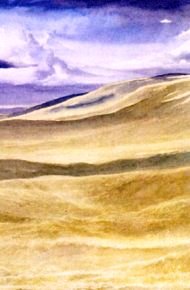
Even as the Ring is about to begin its journey to Mordor, the traitor Saruman moves against Rohan. His army of orcs and Dunlendings battle the Rohirrim under Theoden's heir Theodred at the Isen River; they defeat the Riders, but are not able to cross the Isen.
The price for holding it is high, though, for Theodred is slain in the battle. His death leaves the Rohirrim wholly in the hands of his bewitched father, who is under the sway of Saruman's servant Wormtongue.
Rohan seems ready to fall.
Images © "Tol Brandir" & "Rohan" by Alan Lee.
February 26, TA 3019
26 February 2006 08:58:53Categories: Tolkien Calendar
Frodo and Samwise enter the eastern Emyn Muil.
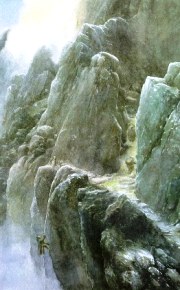
- But on with our story. This day is overshadowed with sadness
and a sense of gloom. After escaping the attack of the Orcs
and Boromir's treachery at Parth Galen, Frodo and Sam separate
from the rest of the Fellowship and set out across the Emyn Muil
towards Mordor. Indeed the first book of Tolkien's Trilogy ends
with a very somber passage... "Then shouldering their burdens,
they set off, seeking a path that would bring them over the grey
hills of the Emyn Muil and down into the Land of Shadow."
Meriadoc and Peregrin captured. Aragorn sets out in pursuit of the Orcs at evening. Éomer hears the descent of the Orc-band from the Emyn Muil.
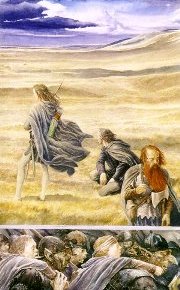
- Forces unknown to the Fellowship are also moving and they will play an important part in the coming days. Here is the first day that Éomer appears and his actions are decisive. In the mythical Tolkien world, Éomer hears the Orc-band's descent of the East Wall of Rohan, some many miles distant and begins his pursuit. Merry and Pippin have only just been captured by Saruman's forces this day, yet the events are now in motion that will allow their escape. Both Éomer and Aragorn are in hot pursuit of Orcs and two Hobbits, bringing about the imminent meeting of the two powerful future Kings.
Breaking of the Fellowship. Death of Boromir; his horn is heard in Minas Tirith.
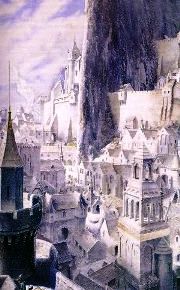
This is the last day that we see the complete Fellowship (sans Gandalf) together until they have completed their own journeys in the Quest. There is almost a mystical quality to this day. Boromir redeems himself from his treacherous actions with Frodo but it costs him his life. Many who read this part of the story consider his death in protection of Pippin and Merry as the ultimate redemptive act. I am always struck by the biblical passage, "Greater love hath no man than this, that a man lay down his life for his friends." in this part of Tolkien's text, and I wonder if the Professor, with his strong Catholic faith, was as well.
Many far leagues to the south, Boromir's horn is heard in Minas Tirith, calling for aid. An air of doom now surrounds not only the Fellowship, but the whole of the world of Men.
- "From the Gate of Kings the North Wind rides, and past the roaring falls;
And clear and cold about the tower its loud horn calls.
'What news from the North, O mighty wind, do you bring to me today?
What news of Boromir the Bold? For he is long away.'
'Beneath Amon Hen I heard his cry. There many foes he fought.
His cloven shield, his broken sword, they to the water brought.
His head so proud, his face so fair, his limbs they laid to rest;
And Rauros, golden Rauros-falls, bore him upon its breast.'
'O Boromir! The Tower of Guard shall ever northward gaze
To Rauros, golden Rauros-falls, until the end of days."
Separation and resolve and foreboding and determination seem to mark this dark hour of the Fellowship's now far flung quests. Adventure has given way to heavy hearts and urgent journeys.
Images © "Emun Muil", "The Chase of Aragorn, Legolas and Gimli", & "Within Minas Tirith" by Alan Lee.
Last edited: 3 July 2022 14:29:05

